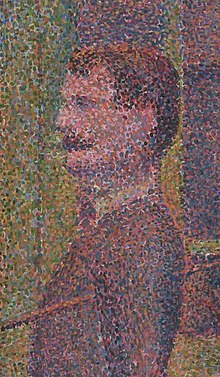We are conditioned into our modern opinion of Christianity as a singularity, a thing, a solid well-defined distinction.
That is because of our conditioning to look backward through time as through a series of transparencies forming a gestalt.
What was Christianity?
It was a pointillist painting:

Little blobs of ideas, legends, stories, opinions, activities--all at odds--are like those little daubs of color.
Step back and away (through millennia) and BOOM! the "subject" mysteriously appears--but--it is a trick of the mind.
If we stop saying "CHRISTianity" and subsitute MESSIAHianty or ANOINTEDianty we get a grasp of it.
Messianic Jews had their own idea of Jesus. Gentiles accustomed to demi-gods had another idea of Jesus.
Arguments, debate, fulminations, fistfights--led to brawls, bloodshed and bullying: all forming the blobs and daubs into CHRISTIANITY.
__________________
What were these people called? What was their idea of who or what the "Christ" required of them in their lives?
AKOLOUTHONTES is the term used in the NT. SEVENTY-NINE references to akolouthontes appears= "followers."
Anything else? Yes.
MATHETAI is used NINETEEN times. Mathetai=learners (i.e. disciples.)
__________________
What were these persons following as akolouthontes (followers)? What were they learning as mathetai (learners.)?
Did they walk up to each other and say, "Are you in the TRUTH?"
No.
They would ask if somebody was akolouthonte of He Hodos (Follower of THE PATH.)
Okay--what WAS this Path?
What did the teacher (Didaskale) teach?
Answer: OPINIONS!
Depending on where you lived and who you spoke to--you followed other people's opinions, and those opinions were CHRISTIANTIY (in Antioch) but merely OPINIONS HELD, FOLLOWED and TAUGHT elsewhere.
Each neighborhood where persons gathered to discuss, debate, praise and learn about Jesus was like a denomination today.
There are about 40 Thousand denominations calling themselves "Christian." Each of these thinks THEY are correct and everybody else is not.
(That much hasn't changed in our own contemporary Christian community.)
There were groups who came to chat and argue who had to be served drinks and snacks.
Who served this function? DIAKONOS (deacons) served.
Sometimes neighborhood groups wanted to get together with other neighborhood groups. Who arranged that liaison between neighbors?
These were called PRESBYTEROI or "Elders."
_____________________________________
As in every movement, it takes somebody with a genuine drive and genius for promotion who can make things happen.
(Saul)PAUL of Tarsus was that guy. He had never (previously) met Jesus or spoken to his chosen (apostles) followers--but--
***************HE CLAIMED to have encountered a supernatural vision of Jesus.*************
This is like a modern day UFO sighting where a man gets kidnapped an probed by aliens!
It was a helluva exciting story! A great one to tell . . . and believe because it was exciting and definitive.
If you believed that story and Paul's letters (epistles) you began to have some kind of ORGANIZED teaching (or right belief: orthodoxy.)
_____________________________
Jesus' apostles (chosen ones) were not teaching the same thing Paul was teaching. But, Paul was INCLUDING Gentiles and corrupting the ironclad
grip of Jewishness (Law of Moses) by making it non-binding!
If you don't think that was horrifying to Messianic Christians . . . think again!
Were it not for the fact the Romans destroyed the center of worship (Jerusalem) in 70 c.e.---Paul's version of Christianity probably would never
have gained traction.
With Jerusalem destroyed, the Jews fled to avoid round-up and crucifixion leaving the door wide open for PAUL.
_________________
The tensions between Jewish Christianity and Gentile Christianity is evident in the TRINITY doctrine which only
took a firm hold after it was incorporated into the official imprimatur of Constantine (with no Jews around to decry it in force.)
Our so-called BIBLE was an apologetic mish-mash assembled to thwart yet another branch of burgeoning Christianity: MARCION's Gnostic Christianity.
______
And off we go . . .
Early Christianity was ONE BIG ARGUMENT of orthodoxy vs. apostacy, i.e. my OPINION vs your OPINION.
The official nature of the institution of Catholic (i.e. Universal) Church made THAT version more pervasive.
To study the early Church Fathers is to study a litany of debates, accusations, wild battles and pious pronouncement.
_____________________
Until the masterworks of Augustine and Aquinas literally became the official doctrines of Catholicism, the AUTHORITY of the Pope and Cardinals and Priests were all that was necessary to be a "true" Christian.
______________________
THE MAGISTERIUM of the Church did not require "learning a script" of right Christian belief for 99% of Christians on earth for 1500 years.
Going to Mass, confession, taking the bread and wine, being forgiven by the Priest . . . THAT was Christianity.
Then, Martin Luther came along and the corruption of the political and religious Catholic institution lost its status.
DENOMINATIONALISM was brought back!
Protestantism is opinion-ism.
Any hack with a Bible and folded hands can cook up a crazy religion (Mormons, JW's, you-name-it) and that
is what brings us to 2014.
